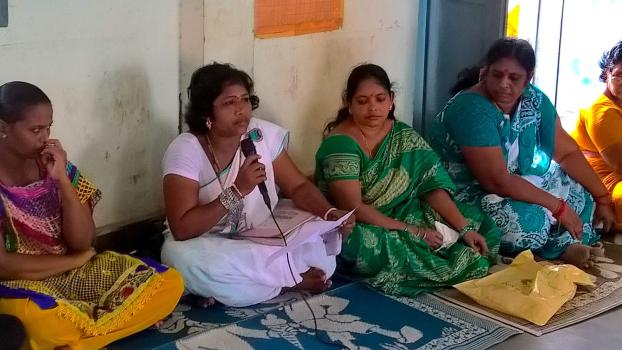Protecting and Empowering Women and Girls for Safer Access to Water
Content Warning: This post deals with topics pertaining to sexual abuse and exploitation
Lack of access to safe drinking water, sanitation, and hygiene (WASH) disproportionately impacts women and girls. From their time spent collecting water, to their unique needs for privacy to manage menstruation, women stand to benefit significantly from efforts to strengthen water and sanitation systems. However, for these investments to have widespread impact on gender equality and female empowerment, they must also address systemic, cross-cutting challenges that keep women from fully participating in their households, communities, and governments, such as gender-based violence (GBV).
The U.S. Strategy to Prevent and Respond to Gender-Based Violence Globally (2016), which provides a U.S. Government-wide global framework for preventing and responding to GBV, offers a comprehensive definition:
Any harmful threat or act directed at an individual or group based on actual or perceived biological sex, gender identity and/or expression, sexual orientation, and/or lack of adherence to varying socially constructed norms around masculinity and femininity. It is rooted in structural gender inequalities, patriarchy, and power imbalances. GBV is typically characterized by the use or threat of physical, psychological, sexual, economic, legal, political, social and other forms of control and/or abuse. GBV impacts individuals across the life course and has direct and indirect costs to families, communities, economies, global public health, and development.
A growing body of WASH sector evidence points to widespread fear or experiences of GBV while collecting water or using shared or public latrine blocks. Less common, though, is evidence of transactional sex, a form of GBV sometimes called “sexploitation” or “sextortion,” whereby sex is exchanged for goods and services like potable water or menstrual hygiene supplies.
Access to water in many highly populated slums like Kibera, Kenya’s largest informal settlement, remains complicated. Informal vendors often control water access in this type of setting, where governments do not invest enough in well-managed and easily accessible water systems that reliably serve the poorest. To better understand these dynamics and their links to sexual exploitation for water, the Kenya Water and Sanitation Civil Society Network and the African Civil Society Network on Water and Sanitation launched the Sex for Water (SFW)—Promoting Safe Space for Girls and Young Women in Kibera project.
A SFW baseline survey conducted in July 2020 found that, despite high rates of improved water sources, more than half of residents reported poor water quality and general dissatisfaction with the level of water service delivery, its cost, or accessibility. More than 4 percent of respondents (the actual number is likely higher) reported sexual exploitation in exchange for water access as the reason for their dissatisfaction; of these, more than 67 percent categorized these instances as occurring “always” or “sometimes” during water collection. Unmarried women over the age of 35 accounted for most survivors who responded to the survey.
Due to the inherent power dynamics that result in women and girls being tasked with retrieving water, sexual exploitation and abuse for water can happen in two ways: 1) directly, in which a water vendor exploits resource scarcity by demanding sex in exchange for water; or 2) indirectly, in which women or girls are coerced into exchanging sex for water due to a lack of money to pay, as described by Margret A. She recalled her childhood as a period of frequent water shortages. With just a few water vending points serving all of Kibera, local vendors hiked prices and sexually exploited young girls and women in exchange for expedited access to water. Margret said: “Because we had to get water even at night, we were exposed to many risks. They used girls. You had to pay for the water. We did not have money, so we paid with our bodies.”
Better understanding the dynamics of a community is essential to identifying vulnerabilities. In 2015, a community power analysis of Kibera uncovered the issue of sexual exploitation for water, leading to the SFW project. Supporting survivors to report GBV and providing safe spaces where survivors can receive counseling are also essential. This means that WASH stakeholders must be able to effectively and safely ask questions, provide information, and give referrals to social and legal services (which, in turn, means that they need to know the local GBV referral systems).
The Senator Paul Simon Water for the World Act of 2014 recognized the link between water and sanitation and women’s empowerment by requiring USAID to consider opportunities to impact the health and educational outcomes of women and girls through WASH investments in making high-priority country determinations each year. However, data on WASH–related GBV are lacking. Closing this gap is critical to mitigating risk, and that requires action from WASH stakeholders.
To more fully address WASH–related GBV, the WASH sector will need to expand its vision of success beyond service delivery to include outcomes that reflect the many ways WASH impacts people’s lives. This means challenging assumptions, asking different questions, and including new stakeholders. In all efforts to prioritize GBV prevention and response globally, USAID works to engage with survivors to ensure proposed activities respond to and reflect their needs. This requires that “do no harm” principles are applied—and that WASH stakeholders understand what that means in practice.
USAID WASH and GBV activities can draw other lessons from the SFW project, such as the importance of including both men and women in discussions about GBV, and working with WASH institutions and communities to put safeguards in place to reduce WASH-related GBV. Perhaps the most important lesson, though, is in the mere fact that the SFW project took place at all: the WASH sector, and every sector, must recognize that GBV is a problem we all must help to solve.
By Sareen Malik, Executive Secretary, African Civil Society Network on Water and Sanitation; Chaitra Shenoy, Senior Gender-Based Violence Advisor, USAID, Gender Equality and Women’s Empowerment Hub; and Lisa Schechtman, Senior Policy and Partnerships Advisor, USAID, Center for Water Security, Sanitation, and Hygiene


